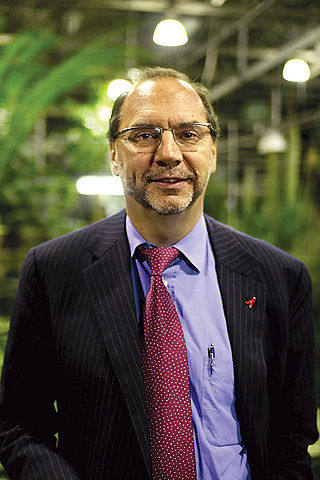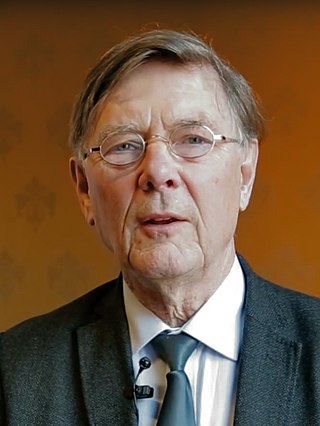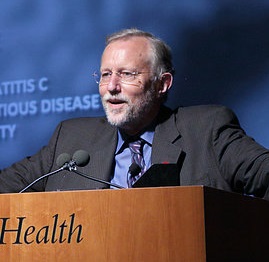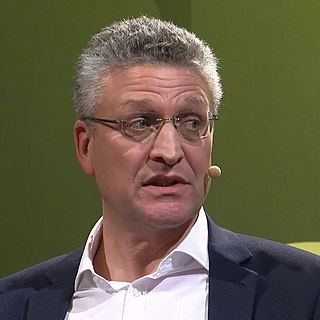Related Research Articles

Sir Peter Karel, Baron Piot, is a Belgian-British microbiologist known for his research into Ebola and AIDS.
Lasker-DeBakey Clinical Medical Research Award is one of four annual awards presented by the Lasker Foundation. The Lasker-DeBakey award is given to honor outstanding work for the understanding, diagnosis, prevention, treatment, and cure of disease. This award was renamed in 2008 in honor of Michael E. DeBakey. It was previously known as the Albert Lasker Award for Clinical Medical Research.

Harvey James Alter is an American medical researcher, virologist, physician and Nobel Prize laureate, who is best known for his work that led to the discovery of the hepatitis C virus. Alter is the former chief of the infectious disease section and the associate director for research of the Department of Transfusion Medicine at the Warren Grant Magnuson Clinical Center in the National Institutes of Health (NIH) in Bethesda, Maryland. In the mid-1970s, Alter and his research team demonstrated that most post-transfusion hepatitis cases were not due to hepatitis A or hepatitis B viruses. Working independently, Alter and Edward Tabor, a scientist at the U.S. Food and Drug Administration, proved through transmission studies in chimpanzees that a new form of hepatitis, initially called "non-A, non-B hepatitis" caused the infections, and that the causative agent was probably a virus. This work eventually led to the discovery of the hepatitis C virus in 1988, for which he shared the Nobel Prize in Physiology or Medicine in 2020 along with Michael Houghton and Charles M. Rice.
The Robert Koch Medal and Award are two prizes awarded annually by the German Robert Koch Foundation for excellence in the biomedical sciences. These awards grew out of early attempts by German physician Robert Koch to generate funding to support his research into the cause and cure for tuberculosis. Koch discovered the bacteria responsible for the dreaded disease and rapidly acquired international support, including 500,000 gold marks from the Scottish-American philanthropist Andrew Carnegie.

Harald zur Hausen NAS EASA APS was a German virologist. He carried out research on cervical cancer and discovered the role of papilloma viruses in cervical cancer, for which he received the Nobel Prize in Physiology or Medicine in 2008. He was chairman of the German Cancer Research Center in Heidelberg.

Nonstructural protein 2 (NS2) is a viral protein found in the hepatitis C virus. It is also produced by influenza viruses, and is alternatively known as the nuclear export protein (NEP).

The Robert Koch Institute (RKI) is a German federal government agency and research institute responsible for disease control and prevention. It is located in Berlin and Wernigerode. As an upper federal agency, it is subordinate to the Federal Ministry of Health. It was founded in 1891 and is named for its founding director, the founder of modern bacteriology and Nobel laureate Robert Koch.

Matthias Werner Hentze is a German scientist. He is the director of the European Molecular Biology Laboratory (EMBL), co-director of the Molecular Medicine Partnership Unit between EMBL and Heidelberg University, and Professor of Molecular Medicine at Heidelberg University.

Albertus Dominicus Marcellinus Erasmus "Ab" Osterhaus is a leading Dutch virologist and influenza expert. An Emeritus Professor of Virology at Erasmus University Rotterdam since 1993, Osterhaus is known throughout the world for his work on SARS and H5N1, the pathogen that causes avian influenza.

Peter Palese is a United States microbiologist, researcher, inventor and the Horace W. Goldsmith Professor in the Department of Microbiology at the Icahn School of Medicine at Mount Sinai in New York City, and an expert in the field of RNA viruses.

Jörg Hinrich Hacker is a German microbiologist. He served as president of the Robert Koch Institute from 2008 to 2010 and of the German Academy of Sciences Leopoldina from 2010 to 2020. He is the editor-in-chief of the International Journal of Medical Microbiology.

Sir Michael Houghton is a British scientist and Nobel Prize laureate. Along with Qui-Lim Choo, George Kuo and Daniel W. Bradley, he co-discovered Hepatitis C in 1989. He also co-discovered the Hepatitis D genome in 1986. The discovery of the Hepatitis C virus (HCV) led to the rapid development of diagnostic reagents to detect HCV in blood supplies, which has reduced the risk of acquiring HCV through blood transfusion from one in three to about one in two million. It is estimated that antibody testing has prevented at least 40,000 new infections per year in the US alone and many more worldwide.
Werner Henle and Gertrude Henle were a husband and wife team of German-American virologists. The National Library of Medicine called them "a prodigious force in virology, immunology and viral oncology during the second half of the 20th century".

Nonstructural protein 5A (NS5A) inhibitors are direct acting antiviral agents (DAAs) that target viral proteins, and their development was a culmination of increased understanding of the viral life cycle combined with advances in drug discovery technology. However, their mechanism of action is complex and not fully understood. NS5A inhibitors were the focus of much attention when they emerged as a part of the first curative treatment for hepatitis C virus (HCV) infections in 2014. Favorable characteristics have been introduced through varied structural changes, and structural similarities between NS5A inhibitors that are clinically approved are readily apparent. Despite the recent introduction of numerous new antiviral drugs, resistance is still a concern and these inhibitors are therefore always used in combination with other drugs.

Charles Moen Rice is an American virologist and Nobel Prize laureate whose main area of research is the hepatitis C virus. He is a professor of virology at the Rockefeller University in New York City and an adjunct professor at Cornell University and Washington University School of Medicine. At the time of the award he was a faculty at Rockefeller.
Michael J. Sofia is a chemist whose main research focus is hepatitis C virus and hepatitis B virus drug discovery. He was a co-recipient of the Lasker-DeBakey Clinical Medical Research Award for his work on hepatitis C in 2016 and of the Gertrude B. Elion Memorial Award from the International Society for Antiviral Research in 2017.
The Standing Committee on Vaccination at the Robert Koch Institute, or STIKO, is a scientific committee comprising 18 members at the Robert Koch Institute in Berlin, Germany that provides official recommendations for the vaccination schedules used by the individual German states. The committee meets twice yearly to review the latest research regarding vaccination against infectious diseases. Although the STIKO makes recommendations, immunization in Germany is voluntary and there are no official government recommendations. German Federal States typically follow the STIKO's recommendations minimally, although each state can make recommendations for their geographic jurisdiction that extends beyond the recommended list. In addition to the proposed immunization schedule for children and adults, the STIKO recommends vaccinations for occupational groups, police, travelers, and other at risk groups.

Christian Heinrich Maria Drosten is a German virologist whose research focus is on novel viruses (emergent viruses). During the COVID-19 pandemic, Drosten came to national prominence as an expert on the implications and actions required to combat the illness in Germany.

Lothar Heinz Wieler is a German veterinarian and microbiologist who served as president of the Robert Koch Institute (RKI) from 2015 to 2023. In this capacity, he advised the German Federal and State Governments on topics of public health, especially infection hazards, and on the containment of the COVID-19 pandemic.
The 2020 Nobel Prize in Physiology or Medicine was awarded to the American virologists Harvey J. Alter, Michael Houghton and Charles M. Rice "for the discovery of Hepatitis C virus." During the award ceremony on December 10, 2020, Prof. Gunilla Karlsson-Hedestam said:
"The discovery of the Hepatitis C virus by this year’s Laureates laid the foundation for our current understanding about how the virus survives in its niche during the long chronic phase of the infection, and how liver disease develops. And importantly, it led to the development of highly effective anti-viral medicines that now cure the infection in almost all treated persons."
References
- ↑ Ralf Bartenschlager CV, Robert Koch Foundation
- ↑ Foundation, Lasker. "Hepatitis C replicon system and drug development | The Lasker Foundation". The Lasker Foundation. Retrieved 6 February 2018.
- ↑ "CV Ralf Bartenschlager, Leopoldina" (PDF).
- ↑ Scientific Advisory Board Robert Koch Institute (RKI).
- ↑ Scientific Advisory Board Wilhelm Sander Foundation.
- ↑ Yin, Steph (13 September 2016). "Lasker Awards Given for Work in Physiology, Virology and Science Education" – via NYTimes.com.
- ↑ "2016 Lasker~DeBakey Clinical Medical Research Award: Hepatitis C replicon system and drug development". The Lasker Foundation. 2016. Retrieved 18 November 2016.
- ↑ "Ralf Bartenschlager erhält Beijerinck-Preis für Virologie". Leopoldina Nationale Akademie der Wissenschaften.(in German)